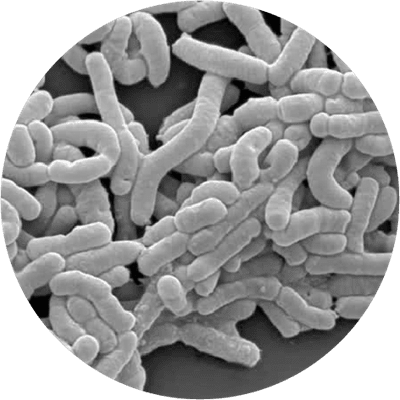


Lactobacillus casei DN-114001 is a strain of the L. casei species which belongs to the huge bacterial family (genus) of Lactobacillus. This patented probiotic strain is owned by a French multinational food-products corporation based in Paris. The L. casei species of Lactobacilli is one of the best probiotic strains for use in the food production industry, and this particular strain of L. casei is one of the active ingredients in many probiotic yoghurt drinks. Unusually, this bacterial strain is classified and known by a variety of different names: Lactobacillus casei DN-114001, Lactobacillus casei Defensis, Lactobacillus casei Immunitas, and Lactobacillus casei Danone. It has been used in research into various aspects of health, from digestive function to immunity. As of April 2020 L. casei has been officially reclassified to Lacticaseibacillus casei so the full strain name may also be referred to as Lacticaseibacillus casei DN-114001 (Zheng J et al., 2020).

Lactobacillus casei DN-114001 is a strain which is often found in yoghurt drinks purchased in supermarkets and consumed by the general population. As an ingredient in food it can be viewed with a certain level of assumed safety. Clinical data gives further evidence of safety. For example a study by Alberda, C. et al., (2018) was conducted in particularly vulnerable participants, who were in intensive care and using a feeding tube. A key aim of this study was to examine safety of L. casei DN-114001 given as a probiotic drink in this alternative way of administration. Tolerance was found to be good, and no serious adverse events were recorded in the probiotic group. Overall this study gives positive results on the safety of this strain in particularly vulnerable people, and therefore we can be confident is assuming safety in healthy people when taken orally.
Survival through the gut has been assessed in stool samples after oral administration. In one trial 12 healthy participants took this strain for 10 days, after which faecal samples showed an increase in this particular strain in every participant, indicating good survival through the challenges of the gut environment (Rochet, V. et al., 2006).

Stress is believed to place a burden on the immune system, as stress responses override many bodily systems, and therefore the effects of chronic anxiety may have far-reaching negative health effects.
A 2004 study attempted to evaluate the effect of a probiotic supplement on the immune system of participants under examination stress. The subjects were university students who were divided into two groups, an intervention group that received a probiotic milk drink fermented with yoghurt cultures plus Lactobacillus casei DN-114001 and a control group given a glass of normal milk. The supplementation was continued over a period of six weeks, three weeks prior to the students’ exams and three weeks afterwards. Levels of anxiety and immunological measurements were taken at the beginning of the study. The results showed that the milk fermented with yoghurt cultures plus Lactobacillus casei DN-114001 was able to modulate the number of lymphocytes and CD56 cells (another immunological marker) in subjects under academic examination stress, whereas the lymphocyte numbers increased, and CD56 levels remained stable in the placebo group (Marcos et al., 2004).
A later randomised, double-blind and controlled study evaluated how the risk of infection may be increased in people under stress, and whether taking a fermented dairy product containing the probiotic Lactobacillus casei DN-114001 would affect the incidence of respiratory and gastrointestinal common infectious diseases (CIDs) and on immune functions in healthy shift workers. The results indicated that daily consumption of Lactobacillus casei DN-114001 could reduce the risk of common infections in stressed individuals such as shift workers (Guillemard E et al., 2010).
In the same year, a further double-blind, randomised, placebo-controlled trial involving 638 children of 3-6 years old evaluated whether the probiotic strain Lactobacillus casei DN-114001 could reduce the incidence of common infectious diseases (CIDs) in children, and their resulting illness-related behaviour. The children were divided into two groups and given a supplement for 90 consecutive days; a treatment group was given the probiotic strain in a fermented milk drink, and a control group was given a placebo (a fermented milk drink without the probiotic strain). The results illustrated that the incidence of CIDs in the treatment group was 19% lower than in the control group, primarily driven by the incidence of gastrointestinal infections. There were no noted behavioural changes (Merenstein D. et al., 2010).
Vaccinations can help to minimise the incidence of influenza, but there is concern that immune responses in older patients may not be as efficient as in younger recipients. A trial therefore attempted to investigate the impact of a daily probiotic supplement on the immune responses to influenza vaccination in an elderly population. To test this effect, two randomised, multicentre, double-blind, controlled studies were conducted during two vaccination seasons, a pilot study in the 2005-2006 season, followed by a second confirmatory trial conducted in the 2006-2007 season. The first study used 86 subjects and the following study used 222 subjects, all of whom were of healthy volunteers over 70 years of age.
The subjects were randomly divided into two groups, an intervention group in which members were given a fermented dairy drink containing the probiotic strain Lactobacillus casei DN-114001 and yoghurt cultures, and a control group in which participants were given a non-fermented dairy product. The supplements were given twice daily for a period of seven weeks in the first study, and thirteen weeks in the final study. Results from both studies indicated that the influenza-specific antibodies increased after vaccination, and these were consistently and significantly higher in the probiotic product group versus the control group (Boge T. et al., 2009).
Further relevant studies: Giovannini et al., (2007), Ortiz-Andrellucchi A. et al., (2008).
Diarrhoea is an unpleasant digestive symptom which may afflict all ages, but it is particularly concerning in children who may become quickly dehydrated if the loose stools persist for an extended period. Solutions for diarrhoea prevention and support are being widely researched, and probiotics are one natural alternative under scientific consideration. Lactobacillus casei DN-114001 is one of the probiotic strains which has been studied for this purpose.
In a recent observational study, the potential benefits of using probiotics to reduce the frequency and consistency of bowel movements was explored. For the purposes of this research, 258 patients were observed in a hospital setting. The patients were being given antibiotics and all had shown symptoms of antibiotic-associated diarrhoea (AAD). They were divided into two groups: a treatment group of 107 patients who were given a probiotic drink containing at least 10 billion cultures of Lactobacillus casei DN-114001, and a control group who were not given any supplement or placebo. Results indicated that the incidence of antibiotic-associated diarrhoea (AAD) was significantly reduced in the intervention group (6.5% incidence in treatment group vs 28.4% for control), and the duration of AAD (in days) was significantly shorter (Dietrich C.G. et al., 2014).

An earlier randomised, double-blind trial was conducted to determine whether a probiotic yoghurt with Lactobacillus casei DN-114001 strain would improve the incidence of diarrhoea in 928 children aged 6-24 months. Members of the control group were all given a plain yogurt, and those in the intervention group were given a yoghurt drink containing the probiotic strain at a strength of 100 million cfu/ml, both for a period of four months. The results showed a statistically significant difference between the treatment and control groups, with the incidence of diarrhoea being significantly reduced in those taking the Lactobacillus casei DN-114001 fermented milk (15.9%) compared to those consuming plain yoghurt (22%) (Pedone et al., 2000).
Another study was conducted over a six month period in a nursery setting, using 287 children aged 18.9 months. The children were either given milk fermented by a combination of yoghurt cultures including Lactobacillus casei DN-114001, or a control product in the form of a milk jelly. Frequency and consistency of stools were monitored daily. Results showed that although the incidence of diarrhoea was unchanged in both groups, the severity of diarrhoea over the six-month study was significantly decreased (by 4.3 days) in those taking the Lactobacillus casei DN-114001 fermented milk (Pedone et al., 1999).
Further Related Studies: Agarwal et al., (2002), Llopis M. et al., (2005), Sýkora J. et al., (2005), Zakostelska Z. et al., (2011).
Inflammatory bowel disease (IBD) is a term used to primarily encompass two serious and debilitating forms of bowel disorder, Crohn’s disease and ulcerative colitis. Extensive research is being conducted to try and determine the pathophysiology of these increasingly prevalent conditions and there is now believed to be an auto-immune influence in the development of these conditions. It is an extremely difficult condition for medical practitioners to manage, with severe cases requiring surgery and very strong immune-suppressing drugs; therefore, as you will see from other pages in this database, the role of probiotic bacteria in modulating the immune response is now being fully explored because the interaction of commensal bacteria with the intestinal immune system is believed to be a key factor in the development of IBD.
A 2009 study tested the potential for probiotics to modulate inflammation in IBD by analysing ileal specimens from IBD patients with Crohn’s disease (CD), obtained during surgery. The mucosal samples were incubated with either the Lactobacillus casei DN-114001, its genomic DNA, or Escherichia coli ATCC 35345, and the resulting immune responses to each of the bacteria or its DNA were evaluated. TNF-alpha, IFN-gamma, IL-2, IL-6, IL-8, and CXCL1 were measured in the intestinal fluid, and tissue expression of key pro-inflammatory cytokines (IL-6, TGF-beta, IL-23p19, IL-12p35, IL-17F), and chemokines (IL-8, CXCL1, CXCL2) was evaluated after incubation with the Lactobacillus casei or Escherichia coli strains.
Results indicated that Lactobacillus casei DN-114 001 significantly decreased secretion of TNF-alpha, IFN-gamma, IL-2, IL-6, IL-8, and CXCL1 by CD mucosa, but the effect was not reproduced by incubation with the L. casei DN-114001 DNA. Secondly, it was noted that the live Lactobacillus casei DN-114001 bacteria appeared to downregulate expression of IL-8, IL-6, and CXCL1, and did not modify expression of IL-23p19, IL-12p35, and IL-17F. In contrast, it was noted that the Escherichia coli bacteria significantly upregulated expression of all these cytokines suggesting that it promotes inflammation in IBD, but that Lactobacillus casei DN-114001 may be able to directly prevent and counteract the pro-inflammatory effects of Escherichia coli (Llopis M et al., 2009).
Further Relevant Studies: Carol M. et al., (2006), Hacini-Rachinel F. et al., (2009), Ingrassia I. et al., (2005).
Authors: Information on this strain was gathered by Joanna Scott-Lutyens BA (hons), DipION, Nutritional Therapist; and Kerry Beeson, BSc (Nut.Med) Nutritional Therapist.
Last updated - 22nd May 2020
As some properties & benefits of probiotics may be strain-specific, this database provides even more detailed information at strain level. Read more about the strains that we have included from this genus below.
Lactobacillus acidophilus strains: Lactobacillus acidophilus LA-05, Lactobacillus acidophilus NCFM®, Lactobacillus acidophilus Rosell-52.
Lactobacillus casei strains: Lactobacillus casei Shirota.
Lactobacillus plantarum strains: Lactobacillus plantarum LP299v.
Lactobacillus reuteri strains: Lactobacillus reuteri Protectis and Lactobacillus reuteri RC-14®.
Lactobacillus rhamnosus strains: Lactobacillus rhamnosus LGG®, Lactobacillus rhamnosus HN001, Lactobacillus rhamnosus GR-1® and Lactobacillus rhamnosus Rosell-11.
Lactobacillus paracasei strains: Lactobacillus paracasei CASEI 431®.
For more information and the latest research on probiotics, please visit the Probiotic Professionals pages.
Agarwal K.N., Bhasin S.K. (2002), ‘Feasibility studies to control acute diarrhoea in children by feeding fermented milk preparations Actimel and Indian Dahl’. European Journal of Clinical Nutrition. 56 (4): 56–9.
Alberda, C. et al., (2018) ‘Feasibility of a Lactobacillus casei Drink in the Intensive Care Unit for Prevention of Antibiotic Associated Diarrhea and Clostridium difficile’. Nutrients, 10(5). pii: E539. doi: 10.3390/nu10050539.
Boge T. et al., (2009), ‘Probiotic fermented dairy drink improves antibody response to influenza vaccination in the elderly in two randomised controlled trials’. Vaccine, 27(41):5677-84.
Carol M. et al., (2006), ‘Modulation of apoptosis in intestinal lymphocytes by a probiotic bacteria in Crohn’s disease’. J Leukoc Biol., 79(5):917-22.
Dietrich C.G. et al., (2014), ‘Commercially available probiotic drinks containing Lactobacillus casei DN-114001 reduce antibiotic-associated diarrhea’. World Journal of Gastroenterology, 20(42):15837-44.
Fayol-Messaoudi D.et al., (2005), ‘pH-, Lactic acid-, and non-lactic acid-dependent activities of probiotic Lactobacilli against Salmonella enterica Serovar Typhimurium’. Appl Environ Microbiol.,71(10):6008-13.
Galdeano C.M. et al., (2009), ‘Mechanisms involved in the immunostimulation by probiotic fermented milk’. J Dairy Res.,76(4):446-54.
Giovannini M. et al., (2007), ‘A randomized prospective double blind controlled trial on effects of long-term consumption of fermented milk containing Lactobacillus casei in pre-school children with allergic asthma and/or rhinitis’, Pediatr Res., 62 (2):215–20.
Guillemard E. et al., (2010), ‘Effects of consumption of a fermented dairy product containing the probiotic Lactobacillus casei DN-114 001 on common respiratory and gastrointestinal infections in shift workers in a randomized controlled trial’. J Am Coll Nutr., 29(5):455-68.
Guillemard E. et al., (2010), ‘Consumption of a fermented dairy product containing the probiotic Lactobacillus casei DN-114001 reduces the duration of respiratory infections in the elderly in a randomised controlled trial’. Br J Nutr., 103(1):58-68.
Hacini-Rachinel F. et al., (2009), ‘CD4+ T cells and Lactobacillus casei control relapsing colitis mediated by CD8+ T cells’. J Immunology, 183(9):5477-86.
Hickson et al., (2007) ‘Use of probiotic Lactobacillus preparation to prevent diarrhoea associated with antibiotics: randomised double blind placebo controlled trial’ – British Medical Journal Jul 14;335(7610):80.
Ingrassia I. et al., (2005), ‘Lactobacillus casei DN-114 001 inhibits the ability of adherent-invasive Escherichia coli isolated from Crohn’s disease patients to adhere to and to invade intestinal epithelial cells’. Appl Environ Microbiol., 71(6):2880-7.
Llopis M. et al., (2005), Mucosal colonisation with Lactobacillus casei mitigates barrier injury induced by exposure to trinitronbenzene sulphonic acid Gut. Jul;54(7):955-9.
Llopis M. et al., (2009), ‘Lactobacillus casei downregulates commensals’ inflammatory signals in Crohn’s disease mucosa’. Inflamm Bowel Dis.,15(2):275-83.
Marcos A. et al., (2004), ‘The effect of milk fermented by yogurt cultures plus Lactobacillus casei DN-114001 on the immune response of subjects under academic examination stress’. Eur J Nutr., 43 (6):381–9.
Merenstein D. et al., (2010), ‘Use of a fermented dairy probiotic drink containing Lactobacillus casei (DN-114 001) to decrease the rate of illness in kids: the DRINK study. A patient-oriented, double-blind, cluster-randomized, placebo-controlled, clinical trial’. European Journal of Clinical Nutrition, 64(7):669-77.
Ortiz-Andrellucchi A. et al., (2008), ‘Immunomodulatory effects of the intake of fermented milk with Lactobacillus casei DN114001 in lactating mothers and their children’. British Journal of Nutrition, 100(4):834-45.
Parra M.D. et al., (2004), ‘Daily ingestion of fermented milk containing Lactobacillus casei DN114001 improves innate-defense capacity in healthy middle-aged people’. J Physiol Biochem., 60(2):85-91.
Pawłowska J. et al., (2007), ‘Effect of Lactobacillus casei DN-114001 application on the activity of fecal enzymes in children after liver transplantation’ Transplant Proc., 39(10): 3219–21.
Pedone C.A. et al., (2000), ‘Multicentric study of the effect of milk fermented by Lactobacillus casei on the incidence of diarrhoea’. Int J Clin Pract., 54 (9):568–71.
Pedone C.A. et al., (1999), ‘The effect of supplementation with milk fermented by Lactobacillus casei (strain DN-114 001) on acute diarrhoea in children attending day care centres’. Int J Clin Pract., 53(3):568–71.
Rochet, V. et al., (2006) ‘Effects of orally administered Lactobacillus casei DN-114 001 on the composition or activities of the dominant faecal microbiota in healthy humans’. Br J Nutr, 95(2):421-9.
Sýkora J. et al., (2005), ‘Effects of a specially designed fermented milk product containing probiotic Lactobacillus casei DN-114 001 and the eradication of H. pylori in children: a prospective randomized double-blind study’. J Clin Gastroenterol., 39 (8):692– 8.
Zakostelska Z. et al., (2011), ‘Lysate of probiotic Lactobacillus casei DN-114 001 ameliorates colitis by strengthening the gut barrier function and changing the gut microenvironment’. PLoS One, 6(11):e27961.
Zheng J, Wittouck S. et al., (2020) 'A taxonmonic note on the genus Lactobacillus: Description of 23 novel genera, emended description of the genus Lactobacillus Beijerinck 1901, and union of Lactobacillaceae and Leuconostocaceae'. Int.J.Syst.Evol.Microbiol, 70(4): 2782-2858. DOI: 10.1099/ijsem.0.004107